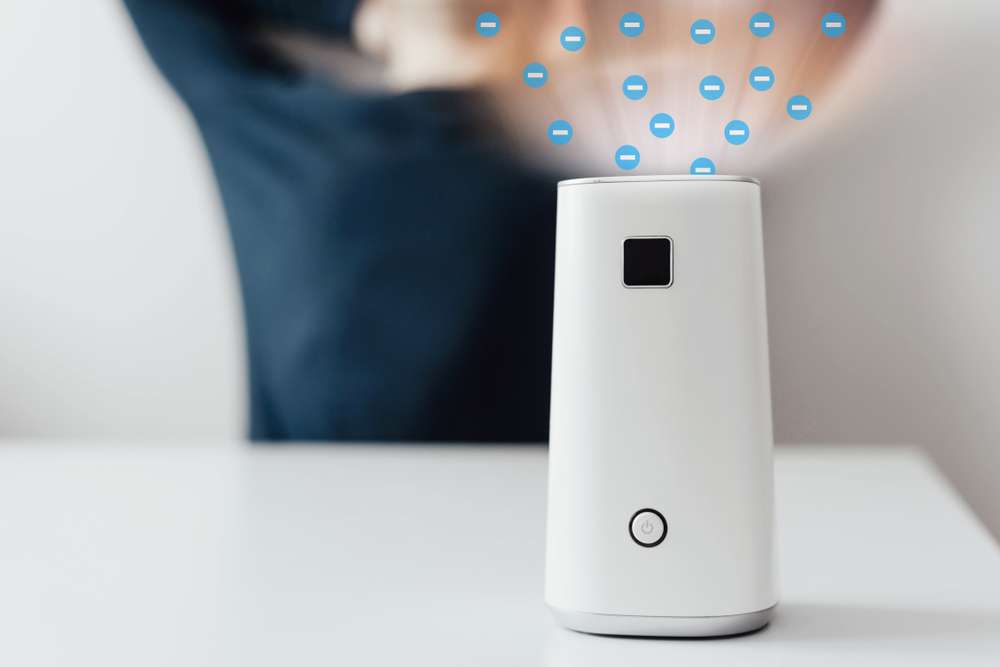Companies that sell ionizers tell us they do all sorts of things, but what do ionizers actually do? What is ionizer air purifier technology and is it worth buying?
An ionizer uses negative ions to remove particles from the air. This process purifies the air by clumping those particles together until they settle onto surfaces faster than normal. Those particles can also attach to those surfaces through static electricity. This means the user has to clean regularly in order to remove those particles from those surfaces. It also means that those particles can be sent back up into the air through activities like cleaning. Ionizers also don’t move much air through them even with a fan. Worst of all, they can create ozone, which can be harmful to our health. Is an ionizer worth buying? Probably not by themselves, but maybe as part of an air purifier using other ways to purify the air too. Either way, you’ll want to do research first to make sure the one you’re getting is safe.
Overview Of Ionizer Air Purifying Technology

What Are Ionizers?
If you’re not familiar, ionizers are a type of air purifier. Sometimes ionizers are the only method an air purifier uses to purify the air. Other times, an air purifier will use multiple ways to purify the air, such as ionization, ultraviolet light, and filters. Ionizers are unique from those other ways of purifying the air (except electrostatic precipitators, which we’ll get to later) because they use negative ions to purify the air.
How Do Ionizers Work?
Ionizers create negative ions by giving an electrical charge to molecules in the air or to particles going through the ionizer. The negative ions attach to other particles in the air, such as dust or bacteria. This gives those particles an electrical charge as well, which then draws those particles together. These clumps become heavier and heavier, which makes them settle faster onto surfaces such as walls, floors, or furniture. It’s also possible for the particles to attach to curtains or carpets if they have a positive charge due to static electricity.
This means a few things. The first thing is that you’ll have to regularly clean in order to finally get rid of those particles. The second thing is that it’s possible for those particles to end up back in the air due to activities in the room, even the cleaning.
Do Ionizers Really Work?
Yes, ionizers do work. They do remove particles from the air, but there are some problems with their process aside from the particles potentially ending up back in the air. The first problem is that many ionizers don’t have fans. This means they can’t move a lot of air through them. Even ionizers with fans don’t move much air through them.
The second problem is that ionizers can’t remove gases. This isn’t an issue if you have an activated carbon filter, but not every air purifier has one of these.
The third and worst problem is that ionizers can create ozone. Ozone is not something you want to be breathing, even in low amounts. This is especially true if you or someone in your home suffers from respiratory diseases such as asthma.
Are Ionizers Safe?
There is no easy answer to this question. There are too many things that go into whether or not an ionizer is safe. If you decide to get an ionizer, research as much as possible to make sure it’s safe for use. To get started, we recommend checking out this article about air purifiers that generate ozone, by the United States Environmental Protection Agency or EPA.
Is An Ionizer Worth Buying?
Ionizers by themselves aren’t that great. An air purifier that has more than one way to purify the air, including an ionizer, is much more worth your money.
What Types Of Air Purifiers Are Better?
Your best bet for removing particles from the air is air purifiers with filters. Air purifiers with filters have added costs when including filter replacement. They don’t produce ozone though and they are effective at removing pollutants from the air. Look for one that has a pre-filter, activated carbon filter for gases, and a true “High-Efficiency Particulate Air” or HEPA filter for particles.
A Quick Summary Of Ionizer Pros And Cons
Related Questions About Ionizers And Air Purifiers

Is There A Difference Between An Ionizer And An Ionic Air Purifier?
There is no difference. Ionic air purifier is another name for an ionizer.
What’s The Difference Between An Ionizer And An Electronic Air Cleaner?
There is no difference between an ionizer and an electronic air cleaner. Sometimes the term, “electronic air cleaner,” can refer to an electrostatic precipitator though, so double check to make sure which type of air purifier you’re looking at.
What’s The Difference Between An Ionizer And An Electrostatic Precipitator?
The main difference between ESPs and ionizers is ESPs have collecting plates, which are sheets of metal. As particles move through the ESP it gives them an electric charge. The particles then stick to the plates, which have opposite charges (like how magnets work).
Takeaways: What Is Ionizer Air Purifier Technology And Is It Worth Buying?

The bottom line is that most ionizers are not worth buying. They do clean the air, but not better than other air purifiers. Plus, they can create ozone, which is harmful to our health.
If you decide to purchase an air purifier that has an ionizer in it, we recommend doing the research to make sure it’s safe for use.
So, what do you think about ionizer air purifiers? What made you want to get one in the first place?
Let us know in the comments below!

